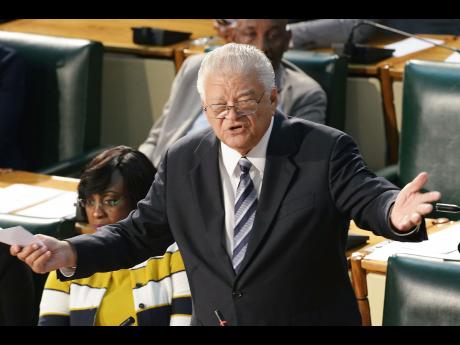Meddling minister? - Samuda defends actions in powdered milk dispute despite legal warnings
As the saga over the decision not to renew the contract of Hugh Graham as chief executive officer of the Jamaica Dairy Development Board (JDDB) continues, The Sunday Gleaner has sourced copies of correspondence indicating his concerns that portfolio minister Karl Samuda was acting in breach of the rules.
But in a release last Friday, the Ministry of Industry, Commerce, Agriculture and Fisheries defended the actions of Samuda and disclosed what it said was a chronology of events that showed there was no wrong move by the minister.
Samuda intervened after the Wisynco Group appealed a decision by the JDDB to deny a request to import powdered milk from Colombia - based on scientific grounds.
Graham considered Samuda's actions out of step with the stipulations of the Jamaica Dairy Development Board Act and sought advice from a private attorney-at-law.
In agreeing with Graham's concerns, the attorney, whose name is being withheld, outlined that while an entity denied an import permit by the JDDB had the right to appeal to the portfolio minister, the minister was not following the right procedures.
That prompted Graham to appeal to Donovan Stanberry, permanent secretary in the agriculture ministry, to guide Samuda in respect of the right course of action.
In a letter dated January 23, 2017 and copied to Donald Elvey, chairman of the board of directors, Graham urged Stanberry to guide the minister.
"I will be grateful if you would kindly utilise your good office to obtain from the Honourable Minister of Industry, Commerce, Agriculture and Fisheries the necessary written instruction in keeping with the exercise of his authority under the Jamaica Dairy Development Board Act to grant an appeal to his office by Wisynco Group Limited against the decision of the JDDB to decline their application for a licence to import milk powder for reason of standards, health and public safety consideration," wrote Graham.
He added: "The minister's decision to set aside the decision of the JDDB (and his earlier decision to uphold the JDDB's decision ... ) to grant Wisynco's licence for the importation of 100 tonnes of milk powder per year, was communicated verbally in a meeting convened on Thursday, December 19, 2016 by him with representatives of Wisynco, to which I was invited ... .
"As you will appreciate permanent secretary, such written instruction is required for the dual purposes of the records of the JDDB, which currently reflect our previous decision in keeping with the exercise of our authority as the regulator of the trade in dairy products under the Jamaica Dairy Development Board Act."
ACTION FOR JUDICIAL REVIEW
The view from the independent attorney that Samuda was acting incorrectly seemed to be endorsed by Marsha A. Locke, acting senior legal officer in the ministry's legal services unit.
"I have seen (the attorney's) advice on the matter and I agree with said advice ... I am also of the view that the minister is taking an informal approach by calling this meeting, more so perhaps he is attempting to mediate the matter at the instance of Wisynco's attorney.
"If Wisynco intends to fill an action for judicial review a request may be made of you to provide written reasons for the JDDB's decision that has aggrieved them, if you have not already done so. When you attend the meeting of the 18 instant at all time you must be guided by the act, in particular Section 27 which sets out the appeal process," wrote Locke.
But Samuda has rejected claims that he acted incorrectly in the matter and argued that it was the strong investment portfolio of the applicant in question that swayed him.
"They have spent more than $650 million in providing equipment to facilitate their entry into the (industry) business, albeit to include a broader involvement, including different types of juices, etcetera, $600 near $700 million.
"Now picture me as minister faced with that opportunity, with not people of straw, people of investments capabilities that can move this country forward, and I am to sit and tolerate the kind of negativism, the kind of small-minded thinking and for what reason I really don't know," said Samuda at a media briefing last week.
"One would have thought that this is something that everybody would be willing to jump at, but the reports of the meeting will reveal that the former CEO of the Dairy Development Board, in the presence of the leadership group that came to represent their claim, he made a comment that there was something suspicious about this group, suppen suspicious about this investor, this applicant.
"God almighty, something suspicious about Wisynco, about Trade Winds with not a scintilla of evidence, so much so that the directors insisted to walk out of the meeting.
"I had to prevail on them and beg them and beseech them to remain and let us negotiate. Whereupon I said verbally then, and I would say it a million times again, that the team is to go back and examine it and as long as they comply with the source they are to be given their licence," added Samuda.
He argued that Graham took upon himself the role of interfering with phytosanitary matters that were not within his remit.
"As minister, I do not hire nor do I fire CEOs. The board of the JDDB in their wisdom and on the basis of their assessment of the CEO's tenure opted not to renew his employment arrangement," Samuda said.


